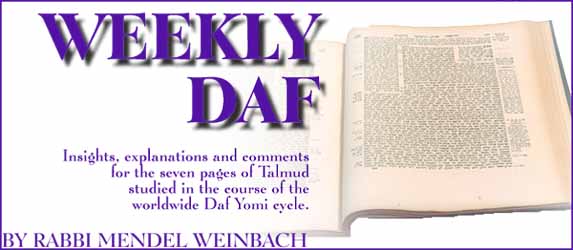Weekly Daf #54
Bava Basra 121 - 127 - Issue #54
15 - 21 Adar Rishon 5755 / 15 - 21 February 1995
This publication is also available in the following formats:
![]()
![]()
![]() Explanation of these symbols
Explanation of these symbols
A Poor Condition
| Rule 1 | Rule 2 | |
| The Rules: | A father declares that he wants to cut off one of his sons from inheriting him. The son hears the declaration and makes no protest. When the father dies the disinherited son inherits along with his brothers. The reason - a man has no right to make conditions contravening Torah Law which entitles all of his sons to inherit him. | A man marries a woman on the condition that he will be exempt from the Torah obligations to provide her with food, clothing and marital relations. His condition regarding marital relations is null and void because it contravenes Torah Law but his condition regarding food and clothing is valid since these are merely monetary matters which are subject to condition. |
| The Problem: | If a man has the power to make a condition in monetary matters even if it contravenes Torah Law (as in Rule Two) why is the father's condition in a monetary matter such as inheritance (in Rule One) not valid? | |
| The Resolution: | The reason why the husband can make the condition regarding food and clothes is that we assume that the woman who agreed to marriage on such terms waived these monetary rights (which we do not assume in the case of marital relations which are not of a monetary nature) and the condition is therefore not contravening Torah Law. In the case of the disinherited son we have no cause to assume that he waived his right to inheritance. He has received nothing comparable to marriage to induce such a concession on his part and his failure to protest is interpreted as an understandable reluctance to anger his father. Without him waiving his right we are left only with the father's power to make conditions in regard to inheritance and this power is denied him because it contravenes Torah Law. | |
Bava Basra 126
Around History With Seven Men
 Seven people span the entire history of the world.
Seven people span the entire history of the world.
- Adam (1-930) was seen by
- Mesushelach (687-1656) who was seen by
- Shem (1558-2158), who was seen by
- Yaakov (2108-2255). Yaakov was seen by
- Amram, who was born to his grandson Kehas in Egypt during the last 17 years of Yaakov's life.
- Achiya Hashiloni, who prophesied in the days of King Yeroboam, was born in Egypt during Amram's lifetime.
- The Prophet Eliyahu saw Achiya and he is still alive.
The figures for the first four are explicitly mentioned in the Torah. The details on the other three are based on logical deduction and historical tradition. (Rashbam)
Bava Basra 121b
General Editor: Rabbi Moshe Newman
Production Design: Lev Seltzer
HTML Design: Eli Ballon, Michael Treblow
© 1995 Ohr Somayach International - All rights reserved. This publication may be distributed to another person intact without prior permission. We also encourage you to include this material in other publications, such as synagogue newsletters. However, we ask that you contact us beforehand for permission, and then send us a sample issue.
This publication is available via E-Mail
Ohr Somayach Institutions is an international network of Yeshivot and outreach centers, with branches in North America, Europe, South Africa and South America. The Central Campus in Jerusalem provides a full range of educational services for over 685 full-time students.
The Jewish Learning Exchange (JLE) of Ohr Somayach offers summer and winter programs in Israel that attract hundreds of university students from around the world for 3 to 8 weeks of study and touring.
Ohr Somayach's Web site is hosted by TeamGenesis
Dedication opportunities are available for Weekly Daf. Please contact us for details.







